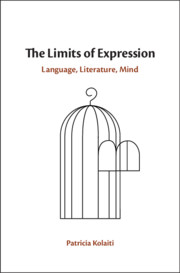
-
Select format
-
- Publisher:
- Cambridge University Press
- Publication date:
- 11 January 2019
- 24 January 2019
- ISBN:
- 9781108290746
- 9781108418669
- 9781108406291
- Dimensions:
- (228 x 152 mm)
- Weight & Pages:
- 0.35kg, 150 Pages
- Dimensions:
- (229 x 152 mm)
- Weight & Pages:
- 0.236kg, 154 Pages
You may already have access via personal or institutional login
Book description
Taking as its starting point what is sometimes called 'the prison house of language' - the widespread feeling that language falls terribly short when it comes to articulating the rich and disparate contents of the human mental tapestry - this book sets out a radically new view of the interplay between language, literature and mind. Shifting the focus from the literary text itself to literature as a case of human agency, it reconsiders a wide range of interdisciplinary issues including the move from world to mind, the existence or otherwise of a property of literariness or essence of art, the nature of literature as a unique output of human cognition and the possible distinctiveness of the mind that creates it. In constant dialogue with philosophy, linguistics and the cognitive sciences, this book offers an invaluable new treatment of literature and literary language, and sketches novel directions for literary study in the twenty-first century.
Reviews
'Probably the best book on literature, language and mind I have ever read. It makes a case for genuinely reciprocal interdisciplinary practices and points the way to epistemologically more robust study in the arts and humanities. It will be hugely influential.'
Tim Wharton - University of Brighton
Contents
Metrics
Altmetric attention score
Full text views
Full text views help Loading metrics...
Loading metrics...
* Views captured on Cambridge Core between #date#. This data will be updated every 24 hours.
Usage data cannot currently be displayed.
Accessibility standard: Unknown
Why this information is here
This section outlines the accessibility features of this content - including support for screen readers, full keyboard navigation and high-contrast display options. This may not be relevant for you.
Accessibility Information
Accessibility compliance for the PDF of this book is currently unknown and may be updated in the future.


